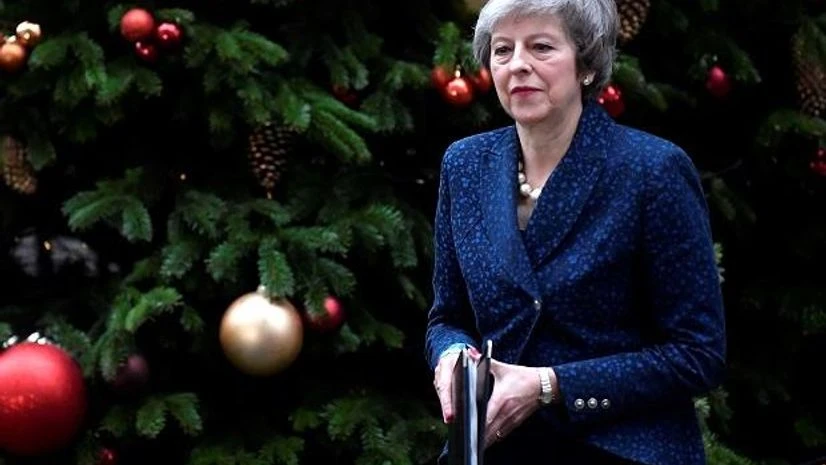British MPs will vote on Prime Minister Theresa May's Brexit deal on January 15, her office said Tuesday, amid growing speculation that London could seek to delay its looming departure from the European Union if the agreement is rejected.
May confirmed the House of Commons will cast its judgment on her withdrawal deal next week, a month after she postponed the vote in the face of certain defeat.
But she is still struggling to convince both opposition lawmakers and her own Conservative party to back the divorce agreement, heightening fears Britain could leave the EU on March 29 without a deal.
Downing Street confirmed May continues to seek assurances from the EU on controversial elements of the Brexit deal relating to Northern Ireland, in a bid to win over her critics.
"The work to secure those assurances is ongoing," the spokesman said, adding that the prime minister hoped to have something to offer MPs before the vote.
May insists Britain will leave the EU in March whatever happens, but there is growing talk of delaying the two-year Article 50 exit process to give her some breathing space to get her deal agreed.
Sources in Brussels have told AFP for several weeks that Britain has been discussing the possibility with European officials, while this was also reported in the Daily Telegraph newspaper on Tuesday.
More From This Section
A junior British minister, Margot James, added fuel to the fire on Monday by suggesting the government may have to delay Brexit if it loses next week's vote.
Brexit Secretary Stephen Barclay denied this, and May's spokesman insisted: "We will not be extending Article 50. "There are people in the European Union who are discussing this issue, but that is not the position of the UK government."
May is under pressure from MPs to say what further assurances she expects to win from Brussels, after EU leaders repeatedly said they did not intend to reopen the deal.
Talks with numerous European leaders in recent days have not yielded a breakthrough.
France's Europe Minister Nathalie Loiseau said "there is nothing more that we can do" to reassure British MPs about the deal and warned against putting too much faith in talk of extending Article 50.
"I don't work on hypotheses -- the current situation is complex enough... Let's stick to where we are now," she added.
An EU diplomat told AFP "it is clear that everyone has in mind that this possibility exists", but cautioned that "it is a very hypothetical option".
Any extension to Britain's departure would be complicated by the elections to the European Parliament in May. After Brexit, it will no longer be represented in the assembly.
The EU diplomat said this meant that an extension would be "narrowly limited to weeks or a few months" -- perhaps no later than the end of June or early July.
In Dublin, Irish Foreign Minister Simon Coveney said: "If such an ask happens and is justified we won't be standing in the way of that." But he said it was a matter for London, noting that May had repeatedly said she had no plans to delay Brexit.
The prime minister has said she is seeking "political and legal reassurances" over the use of a temporary arrangement designed to keep the border with Ireland open after Brexit by aligning Britain with EU trade rules.
The so-called backstop is strongly opposed by eurosceptic Conservatives and Northern Ireland's tiny Democratic Unionist Party (DUP), which props up May's government.
She is looking at a possible time limit to the arrangement, although this is opposed by the EU, as well as increased parliamentary scrutiny of how it is implemented.
But if her efforts fail, many fear Britain could leave the EU with no deal on March 29, with potentially disastrous legal and economic consequences.
A cross-party group of British MPs will later Tuesday seek to amend a finance law to limit the government's tax-raising powers in the event of an accidental "no deal".
The government also stepped up efforts to inform the public of what might happen with a series of radio ads launched Tuesday.

)
